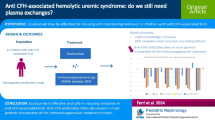Abstract
Background
Severe hypertension (HTN) and acute kidney injury frequently associated with atypical hemolytic uremic syndrome (aHUS) were refractory to various therapies in the pre-eculizumab era. Here we report the case of a 4-month-old boy who developed aHUS presenting with undetectable C3 protein, no predisposing mutations in complement factors, and no antibodies against factor H.
Methods
Repeated plasma infusions and nine sessions of plasmapheresis were ineffective. The patient initially required continuous hemodiafiltration and thereafter peritoneal dialysis. Despite vigorous antihypertensive treatment and improved fluid overload with dialysis, HTN persisted. His low C3 level (<20 mg/dl) suggested unrestricted complement activation. Therefore, based on the suspicion of unrestricted complement cascade in the pathogenesis, treatment with eculizumab, a human anti-C5 monoclonal antibody, was initiated with the aim of controlling disease activity.
Results
Eculizumab therapy resulted in the control of severe HTN and cessation of peritoneal dialysis.
Conclusions
This infant with HTN and acute kidney injury associated with aHUS was treated successfully with eculizumab.


Similar content being viewed by others
References
Waters AM, Lichts C (2011) aHUS caused by complement dysregulation: new therapies on the horizon. Pediatr Nephrol 26:41–57
Ariceta G, Besbas N, Johnson S, Karpman D, Landau D, Licht C, Loirat C, Pecoraro C, Taylor CM, Van de Kar N, Vandewalle J, Zimmerhackl LB; European Paediatric Study Group for HUS (2009) Guideline for the investigation and initial therapy of diarrhea-negative-hemolytic uremic syndrome. Pediatr Nephrol 24:687–696
Tayler CM, Machin S, Wigmore SJ, Goodship THJ (2009) Clinical practice guideline for the management of atypical haemolytic uraemic syndrome in the United Kingdom. Br J Haematol 148:37–47
Noris M, Remuzzi G (2009) Atypical hemolytic-uremic syndrome. N Engl J Med 361:1676–1687
Zuber J, Fakhouri F, Roumenina LT, Loirat C, Fremeaux-Bacchi V (2012) Use of eculizumab for atypical haemolytic uraemic syndrome and C3 glomerulopathies. Nat Rev Nephrol 8:643–657
Lapeyraque AL, Fremeaux-Bacchi V, Robitaille P (2011) Efficacy of eculizumab in a patient with factor-H-associated atypical hemolytic uremic syndrome. Pediatr Nephrol 26:621–624
Kim JJ, Waller SC, Reid CJ (2012) Eculizumab in atypical haemolytic-uraemic syndrome allows cessation of plasma exchange and dialysis. Clin Kidney J 5:34–36
Vilalta R, Lara E, Madrid A, Chocron S, Munoz M, Casquero A, Nieto J (2012) Long-term eculizumab improves clinical outcomes in atypical hemolytic uremic syndrome. Pediatr Nephrol 27:2323–2326
Nurnberger J, Witzke O, Opaza Saez A, Vester U, Baba HA, Kribben A, Zimmerhackl LB, Janecke AR, Nagel M, Kirschfink M (2009) Eculizumab for atypical hemolytic-uremic syndrome. N Eng J Med 360:542–544
Ishikura K, Uemura O, Ito S, Wada N, Hattori M, Ohashi Y, Hamasaki Y, Tanaka R, Nakanishi K, Kaneko T, Honda M; Pediatric CKD Study Group; Japan Committee of Measures for Pediatric CKD of the Japanese Society of Pediatric Nephrology (2013) Pre-dialysis chronic kidney disease in children: results of a nationwide survey in Japan. Nephrol Dial Transplant 28:2345–2355
Ariceta G, Arrizabalaga B, Auirre M, Morteruel E, Lopez-Trascasa M (2012) Eculizumab in the treatment of atypical hemolytic uremic syndrome in infants. Am J Kidney Dis 59:707–710
Dorresteijn EM, van de Kar NCAJ, Cransberg K (2012) Eculizumab as rescue therapy for atypical hemolytic uremic syndrome with normal platelet count. Pediatr Nephrol 27:1193–1195
Garjan M (2012) Early treatment with eculizumab may be beneficial in atypical heamolytic ureamic syndrome. Clin Kidney J 5:31–33
Legendre CM, Licht C, Muus P, Greenbaum LA, Babu S, Bedrosian C, Bedrosian C, Bingham C, Cohen DJ, Delmas Y, Douglas K, Eitner F, Feldkamp T, Fouque D, Furman RR, Gaber O, Herthelius M, Hourmant M, Karpman D, Lebranchu Y, Mariat C, Menne J, Moulin B, Nürnberger J, Ogawa M, Remuzzi G, Richard T, Sberro-Soussan R, Severino B, Sheerin NS, Trivelli A, Zimmerhackl LB, Goodship T (2013) Terminal complement inhibitor eculizumab in atypical hemolytic–uremic syndrome. N Eng J Med 368:2169–2181
Fakhouri F, Hourmant M, Campistol JM, Catalana SR, Espinosa M, Gaber AO, Menne J, Minetti EE, Provot F, Rondeau E, Ruggenenti P, Weelers LE, Ogawa M, Bedrosian CL, Legendre CM (2013) Eculizumab inhibits thrombotic microangiopathy and improves renal function in adult atypical hemolytic uremic syndrome patients. J Am Soc Nephrol 24:49A–50A
Laszik Z (1996) Thrombotic microangiopathies. In: Silva F, D’Agati V, Nadasdy T (eds) Renal biopsy interpretation. Churchill Livingstone, New York, pp 283–308
Bouts A, Monnens L, Davin JC, Struijk G, Spanjaad L (2011) Insufficient protection by Neisseria meningitides vaccination alone during eculizumab therapy. Pediatr Nephrol 26:1918–1920
Ram S, Lewis LA, Rice PA (2010) Infections of people with complement deficiencies and patients who have undergone splenectomy. Clin Microbiol Rev 23:740–780
Acknowledgments
We thank Dr. Camille L. Bedrosian of Alexion Pharmaceuticals Inc. for helpful comments and Alexion Pharmaceuticals Inc. for providing eculizumab (Soliris) without charge prior to the approval of the use of eculizumab for the treatment of aHUS by Health, Labor and Welfare Ministry in Japan. Medical writing support was provided by Dr. John Kincaid (Alexion Global Medical Affairs).
Financial disclosure
None.
Conflict of interest
None.
Author information
Authors and Affiliations
Corresponding author
Rights and permissions
About this article
Cite this article
Ohta, T., Urayama, K., Tada, Y. et al. Eculizumab in the treatment of atypical hemolytic uremic syndrome in an infant leads to cessation of peritoneal dialysis and improvement of severe hypertension. Pediatr Nephrol 30, 603–608 (2015). https://doi.org/10.1007/s00467-014-2975-4
Received:
Revised:
Accepted:
Published:
Issue Date:
DOI: https://doi.org/10.1007/s00467-014-2975-4




